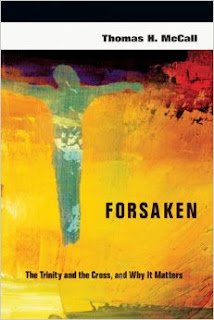Does God care? (divine impassibility)
 An accurate discussion concerning God's love and wrath must account for the full doctrine of God, which includes the topics of divine impassibility and divine simplicity. In this post we'll look at what McCall has to say about the first.
An accurate discussion concerning God's love and wrath must account for the full doctrine of God, which includes the topics of divine impassibility and divine simplicity. In this post we'll look at what McCall has to say about the first.Does God suffer with those who suffer, or is he the "Unmoved Mover"? According to McCall, some misunderstand divine impassibility to mean that God, by definition, is without emotions ("affections"). From this perspective, God is seen to be "cold and detached, the 'Unmoved Mover'" (p64). Understandably, many modern Christians reject this viewpoint, instead embracing a "revisionist viewpoint," which states that...
God is "relational" and "dynamic"... a God who is passionate, which includes being furious in his wrath and gentle in his forbearance. [This God is] actively and intimately involved in his creation... He is anything but "static" or impassive about it, but is... pained by it and suffers accordingly (p65).This revisionist viewpoint rejects the idea of divine impassibility for several reasons:
- It seems to contradict the way the Bible talks about God.
- It seems inconsistent with the central Christian claim that Jesus is the incarnate Son of God who suffered.
- It seems to violate the idea of God's person-hood.
- It seems morally problematic in the face of widespread and horrible human suffering in the world (i.e. how could God be "unmoved" by the terrible suffering in this world?).
God does not undergo successive or fluctuating emotional states. God is not somehow reduced by the actions of the created order. God is not in any way "debilitated" or "crippled" by the passions, as humans so often are (p68).Thus, to say that God is "impassable" does not mean he is devoid of "affection" (emotion). Rather it is to say that in God there is no "mutation" - no distress like that which humans feel, due to human weakness. Yet, God is not devoid of love, patience, compassion and mercy....
...To the contrary, the doctrine of divine impassibility safeguards and protects the fact that holy love is the essence of the triune God. Rather than a denial of the love of God, it resoundingly affirms that holy love.According to McCall, the church fathers who taught divine impassibility did so insisting both that "the unassumed is the unhealed" and also that the one doing this assuming is able to heal what is assumed, rather than be destroyed by it (p69). Indeed, in Christ, we have what we desperately need:
Someone who joins himself to our humanity, and to our condition, but who is not affected by it and ensnared by and overcome by it as we are. In other words, we actually need a Savior who is impassible.McCall continues:
Perfect love, rather than being incompatible with impassibility, demands impassibility. Love that is passible fluctuates. Love that is passible gets caught up on the "heat of the moment." Love that is passible is subject to greater and lesser degrees of intensity. Love that is passible could, then, strengthen or weaken. To affirm impassibility, then, precisely denies that any of these things are true of God. Impassibility thus means that God's love is absolutely steadfast and perfect.... God does not depend on anything outside of himself...[He is] not caught up in the whirling vortex of creaturely events that capture and threaten us all (p70).Thus, in McCalls view, to embrace the Christian doctrine of divine impassibility is not to deny that God is love. Rather, the doctrine as classically defined, establishes that the triune God is indeed a communion of non-changing, perfect thus holy love. That love, which is shared by the Father and Son through the Spirit, is absolute - it does not ebb and flow and in that sense is impassible.
Of course, our minds are stretched to comprehend how God in unchanging perfection relates to us, even in our suffering, thus loving us to the uttermost. Yet that is the testimony of Scripture.
Perhaps the term "impassible" has ceased to be useful in discussing these matters. However, contained within the classic doctrine of impassibility are glorious truths about God as holy love. That God, in the person of the God-man Jesus, has united himself to us in love - a love that is neither aloof or dispassionate. Rather our God - Father, Son and Spirit, is deeply caring, full of tender mercy, near to us, and suffering with and for us in perfect love. To that God we lift our prayers of deep awe and thanksgiving.